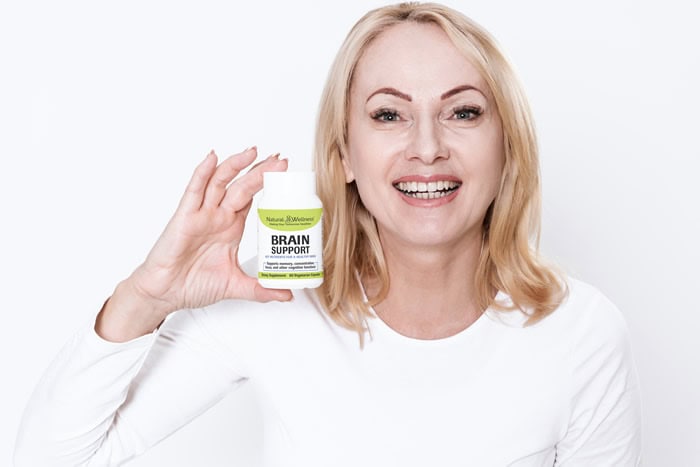While Alzheimer’s can’t always be prevented, there are things you can do to improve brain function and health. These are five actions to try, and June is a good month to begin them in honor of Alzheimer’s and brain awareness.
June is Alzheimer’s & Brain Awareness Month. To help boost your knowledge of this disease and ways to promote brain health, here’s what you need to know.
The Alzheimer’s Association defines this condition as “a type of dementia that affects memory, thinking, and behavior.” (1) Its symptoms include trouble recalling new information, difficulty learning, feeling disoriented and confused, and mood and behavioral changes. In serious cases, it can make it hard to speak, swallow, and walk.
The Alzheimer’s Association adds that Alzheimer’s disease is progressive, meaning it worsens over time. It appears most often in people aged 65 and older, though individuals under the age of 65 can develop younger-onset Alzheimer’s.
3 Causes of Alzheimer’s
In addition to age-related brain changes, the National Institute on Aging shares that Alzheimer’s disease likely occurs due to a combination of: (2)
- Genetics. More than 80 genetic variants have been associated with Alzheimer’s, with three identified as causes.
- Environment. Research indicates that one-third of Alzheimer’s cases are caused by environmental factors, which include education early in life and social interaction in later years. (3)
- Lifestyle. Several lifestyle factors have also been linked with Alzheimer’s development, including diet, smoking, alcohol consumption, and physical activity. (3)
Types of Alzheimer’s Disease
Alzheimer’s disease can be separated into different types or stages. They are: (4)
- Early-stage or mild Alzheimer’s – the person may experience memory lapses but still generally functions independently
- Middle-stage or moderate Alzheimer’s – symptoms become more pronounced, and a higher level of care is required (this stage often occurs over years)
- Late-stage or severe Alzheimer’s – dementia symptoms become severe, causing the individual to no longer respond to others or their environment, ultimately becoming unable to control their movement
How Does Alzheimer’s Affect the Brain?
Alzheimer’s effects are a result of the way it changes the brain. In early stages, there is damage to the neuron connections in areas of the brain responsible for memory while, in later stages, damage occurs in parts of the brain we use to speak, reason, and behave socially. Eventually, the damage spreads, causing greater dysfunction in the brain before turning fatal. (5)
Alzheimer’s Disease Treatment Options
While Alzheimer’s is incurable, certain treatments can help slow the disease’s progression and reduce bothersome symptoms. For example, cholinesterase-inhibiting medications may be prescribed to help prevent the breakdown of the brain chemical acetylcholine, which aids memory and thinking, while atypical antipsychotics can help with agitation. (6)
New treatments are also being explored, particularly those aimed at plaques in the brain. This includes monoclonal antibodies, drugs initially developed to help treat cancer, tau vaccines, and more. (7)
5 Ways to Keep Your Brain Healthy
There are many things you can do to help support your brain’s health. Here are five to work on starting today.
#1: Eat Brain Healthy Foods
We already know that our diet impacts our mental and physical health. But many don’t realize that it also affects our brain’s ability to function at higher levels. Harvard Medical School shares that some of the foods best for brain health include: (8)

- Leafy greens (kale, spinach, collards, and broccoli)
- Fatty fish (salmon, cod, canned light tuna, and pollack)
- Berries (strawberries and blueberries)
- Walnuts
- Tea and coffee
#2: Play Brain Games
Take time daily to play games or do activities that require you to think or strategize. Buy crossword puzzle books or download a brain game app. Do Sudoku or put together a puzzle.

Keep your mental functions strong by working on them regularly.
#3: Exercise Your Body
Physical exercise is also good for the brain. It supports optimal brain health by increasing activity in areas of the brain that control memory and executive function, also promoting new brain cell growth. (9)

If you’re new to exercise, talk to your doctor first to learn whether it’s safe for you.
#4: Make Sleep a Priority
Sleep is critical for brain health, both short- and long-term. If you are sleep-deprived for a few days, you may have trouble remembering or paying attention.

However, when sleep is disrupted long-term, this can lead to neurological dysfunction or, in severe cases, death – by inhibiting the brain’s ability to clear waste, which affects our circulatory and respiratory systems. (10) So, make it a priority to get adequate rest each night.
#5: Take Brain Health Supplements
Studies have found promising effects on brain health for many nutrients and herbs. Among them are omega-3 fatty acids, ginkgo biloba, and phosphatidylserine. (11) Natural Wellness offers a supplement called Brain Support that contains ALL of these ingredients!













![Healthy No-Bake Mint Chocolate Truffles [high protein + no added sugar]](https://healthyhelperkaila.com/wp-content/uploads/2024/08/IMG_1902-e1724891697681.png)







 English (US) ·
English (US) ·